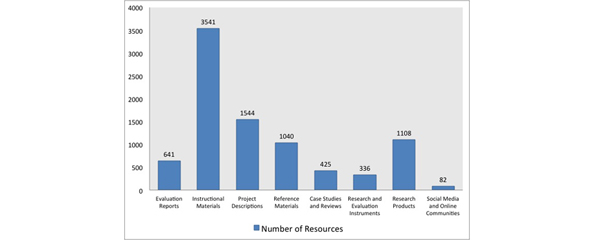State of the Collection on InformalScience.org
InformalScience.org was originally established in 2006 by the University of Pittsburgh Center for Learning in Out of School Environments (UPCLOSE). After being refunded by the National Science Foundation in 2012, CAISE assumed management of the site and re-launched InformalScience.org as a single point of access to resources in the ISE field. Since the redesigned site launch one year ago, InformalScience.org has expanded from a small collection of around 2,000 resources to nearly 8,300 materials related to informal science education. Read on for the latest update about the state of our collection—what is included, how you can use it, and what you can contribute.
Background to the Collection
UPCLOSE launched www.informalscience.org in 2006 with support from the National Science Foundation (NSF). The website included a membership directory, project description database, links to research (including citations), resources for evaluation, and more. CAISE coordinated with the administrators of the site throughout the first five years of the Center, including around Principal Investigator meetings and the creation of the Infrastructure Coordination Roundtable (ICR), a working group composed primarily of NSF Advancing Informal STEM Learning (AISL) principal investigators and staff who have created and/or support websites with informal STEM resources.
CAISE redesigned and re-launched the site in 2013 to support knowledge-sharing, collaboration and the growth of innovation among diverse professionals in the ISE field. Over the past year, we have worked on migrating content from the archived site to the new website, as well as curating new content.
The Informal Commons: What’s Here?
In addition to CAISE-curated projects, research, and evaluation resources, InformalScience.org aggregates content developed by members of the Infrastructure Coordination Roundtable (ICR), a group of projects that have made significant investments in web infrastructures of their own. This content is searchable through the InformalScience.org website, and includes instructional materials from HowtoSmile.org, journal archives from the Visitor Studies Association, evaluation and assessment tools from ATIS, reviews from ExhibitFiles, and more. This allows CAISE to provide an access point for types of materials that we don’t actively collect.
Here’s a breakdown of the types of resources that can be found in the collection:

Behind the Scenes
Beyond the new materials that users can see in the collection, CAISE has been involved in a number of activities designed to improve the collection. One major project was standardizing the metadata from the ICR content sources. This makes the sort functionality of the site work better, so that it’s easier for users to browse by date, author, or contributing organization.
We have also been working on a collection development policy that defines the boundaries of the collection and will guide resource selection as InformalScience.org expands. This helps to keep the collection focused and to ensure that all of the resources that we provide are useful to the field.
How Can I Use the Collection?
All resources on InformalScience.org are tagged with metadata, enabling users to refine their results by Environment Type, Resource Type, Audience, (Scientific) Content, Content Source, and Funding Source.
There are many ways to use the resources on InformalScience.org. For example, a potential PI developing a proposal can view project descriptions to get an idea of what’s already been done in the realm in which they are working. Someone planning a documentary about asteroids could go to “Projects”, and then apply the “Space Science” tag under “Content” or the “Broadcast Media” tag under “Environment Type.” Multiple tags can be applied to any search term, creating search results specifically tailored to a user’s needs. While developing their plan for evaluation or external review after receiving an award, this same potential PI can browse related evaluation reports to get an idea of what kind of instrumentation and assessment tools would be useful to assess the project's process and progress.
Adding New Resources to the Collection
CAISE continues to explore new avenues of collection development. We follow topics and trends in the field, including the progression of research agendas, and seek out relevant resources around those interests. For example, after a recent 21st Century Learning in Natural History Settings discussion forum, we added more materials published or suggested by the participants.
Over the past few months, we have included several new content sources in the collection:
- In February, CAISE entered into a data usage agreement with EBSCO. This means that logged in users of InformalScience.org now have access to EBSCO’s Education Research Complete database, which includes full text articles from more than 1,400 education journals. This provides informal practitioners with access to research that generally would only be available to individuals with a university-based subscription. To access EBSCO resources, select ‘EBSCO Journal Access’ under the ‘Research’ tab. Selected EBSCO content has been indexed in the Informal Commons, which means that these articles will appear in InformalScience.org search results. Currently, there are about 150 articles sourced from EBSCO available through the Informal Commons. We choose articles to index via search to fill gaps in our collection; for example, we just added several new articles on Makerspaces to complement the launch of our Makerspaces and STEM Learning wiki page.
- We recently indexed the archive of Afterschool Matters, a journal published by the National Institute on Out-of-School Time (NIOST). This includes more than a hundred peer-reviewed articles geared toward afterschool practitioners. Articles cover a wide variety of topics ranging from STEM in libraries to the strengths of community-based organizations.
We encourage you to submit your own projects, reference materials, and evaluation reports to the collection to help build a greater knowledge base for the field of informal STEM education. User submissions are typically processed within two business days. If you have a database that you would like to be made available via the Informal Commons, please get in touch to begin a discussion about indexing your collection.